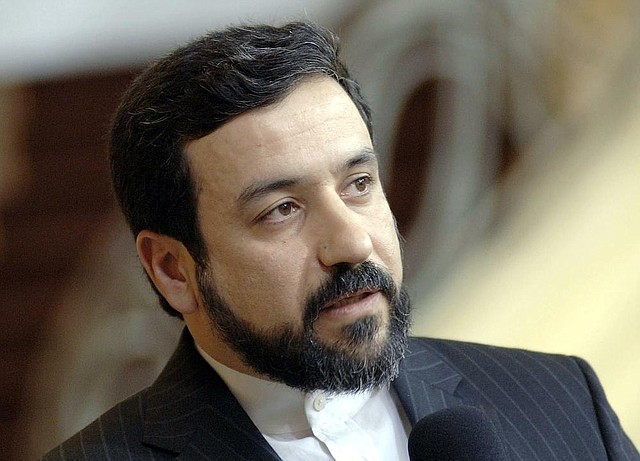Iranians won’t give on choice for U.N.
U.S. visa denial called ‘bullying’
Deputy Foreign Minister Abbas Araghchi was quoted by Iran’s semiofficial Mehr news agency as saying officials would pursue Hamid Aboutalebi's declined Visa status “through anticipated legal channels at the U.N.”
Sunday, April 13, 2014
TEHRAN, Iran - Iran rejected naming a new diplomat Saturday to represent it at the United Nations, with one lawmaker urging the Islamic Republic to stand up to “bullying” from the U.S., which has rejected granting its pick a visa.
The standoff over Hamid Aboutalebi, a member of the group responsible for the 1979 takeover of the U.S. Embassy in Tehran, comes as world powers negotiate with Iran over its nuclear program. It also threatens to stir fresh animosity between countries that recently have seen their relations thaw.
President Barack Obama’s administration said Friday that the U.S. had informed Iran it would not grant a visa to Aboutalebi, suggesting that behind-the scenes discussions to get the Iranians to withdraw him from consideration had failed. On Saturday, Iranian state television anchors discussed the U.S. rejection, with a crawl at the bottom of the screen reading: “The Foreign Ministry says Aboutalebi is Iran’s only choice as its U.N. envoy.”
Prominent lawmaker Alaeddin Boroujerdi said the U.S. had no right to intervene in Iran’s U.N. envoy pick.
“Naming Aboutalebi as Iran’s U.N. envoy has nothing to do with the U.S.,” the Iranian parliament’s website quoted Boroujerdi as saying Saturday. “American opposition to Aboutalebi’s entry is a misuse of the geographical location of the U.N. The Iranian government should stand up to this U.S. bullying.”
Boroujerdi, who heads the Iranian parliament’s national-security and foreign-policy committee, urged Iranian Foreign Minister Mohammad Javad Zarif to write to U.N. Secretary-General Ban Ki-moon to fight the U.S. decision.
Deputy Foreign Minister Abbas Araghchi was quoted by Iran’s semiofficial Mehr news agency as saying officials would pursue the issue “through anticipated legal channels at the U.N.”
Aboutalebiis alleged to have participated in a Muslim student group that held 52 Americans hostage for 444 days during the embassy takeover. He has insisted his involvement in the group Muslim Students Following the Imam’s Line was limited to translation and negotiation.
However, his photograph is displayed on Taskhir, the website of the student group.
According to Mohammad Hashemi, one of the students who led the embassy occupation, Iran’s revolutionary government sent Aboutalebi and Abbas Abdi, another architect of the occupation, as emissaries to Algiers, Algeria. The Algerian capital at that time was a meeting point for liberation movements in developing regions, including the Palestine Liberation Organization.
Iran says that Aboutalebi is one of the country’s best diplomats and that he previously received a U.S. visa. He already served at Iranian diplomatic missions in Australia, Belgium and Italy.
As host country for the U.N., the U.S. is required to allow people invited to the New York headquarters to enter the country. However, exceptions can be made when a visa applicant is found to have engaged in spying against the U.S. or is deemed to pose a threat.
United Nations officials and diplomats expressed concern Saturday that the denial of the visa means the U.S. is less committed to its role as host to the world organization.
Three U.N. diplomats and two U.N. officials said Aboutalebi’s case may make way for the U.S. to use its authority more often to influence diplomatic appointments to the U.N.
The two U.N. officials, who asked not to be named, said they see limited legal footing for the U.S. argument that a dispute decades ago still poses a security threat.
One Western diplomat, who also asked not to be named because of the sensitivity of the matter, echoed the U.N. officials’ argument, while adding that the visa refusal could be justified if there were concrete intelligence on how significant Aboutalebi’s role in the hostage crisis was.
Denying visas to U.N. ambassadorial nominees or to foreign heads of state who want to attend United Nations events in the U.S. is extremely rare, though there appears to be precedent. According to a paper published by Yale Law School, the United States rejected several Iranians appointed to the U.N. in the 1980s who had played roles in the embassy hostage crisis or other acts against Americans.
In 1988, the U.S. denied a visa for Yasser Arafat, then chairman of the PLO, who wanted to speak before the U.N. General Assembly on the Palestinian issue. The U.S. government barred Arafat’s entry because he “knows of, condones and lends support” to acts of terrorism. The General Assembly session was moved to Geneva, where such visa issuance constraints do not exist.
And Iran’s Fars News Agency reported on Sept. 22, 2012, that the U.S. denied entry visas for 20 Iranian officials seeking to attend a session of the U.N. General Assembly.
But after more than three decades of discord, U.S. and Iranian officials have started having occasional direct contact, including a phone call last fall between Obama and new Iranian President Hassan Rouhani. The U.S. and its international partners also have reached an interim agreement with Iran to halt progress on Tehran’s disputed nuclear program.
U.S. Secretary of State John Kerry told a Senate panel last week that it would take Iran two months to produce enough fissile material for one nuclear weapon.
The six-month interim agreement on the nuclear program reached between six world powers and Iran ends in July. Diplomats have been meeting in Vienna to come up with the agreement’s next stage.
Information for this article was contributed by Ali Akbar Dareini of The Associated Press and by Sangwon Yoon, Margaret Talev, Kambiz Foroohar, Derek Wallbank and Roger Runningen of Bloomberg News.
Front Section, Pages 1 on 04/13/2014
